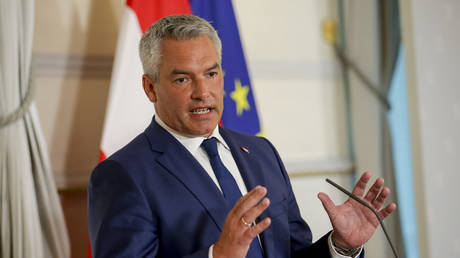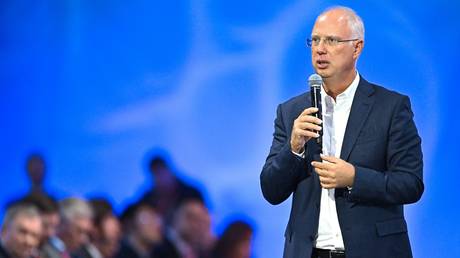Austrian coalition negotiations fail, excluding right-wing election victor
Chancellor Karl Nehammer has declared his resignation to facilitate an “orderly transition” following unsuccessful coalition talks that have persisted for months.. source:TROIB RTS

Following months of coalition negotiations between Austria’s two centrist parties, an agreement has not been reached, which strengthens the position of the right-wing Freedom Party of Austria (FPO) in influencing the country’s political landscape after being sidelined despite winning the election.
The coalition talks aimed to exclude the FPO, which emerged as the largest party with 28.8% of the votes in the September 2024 general election. Efforts by Nehammer’s Austrian People’s Party (OVP) and the Social Democratic Party (SPO), which secured 26.3% and 21.1% of the votes, respectively, ultimately failed due to irreconcilable differences.
Nehammer, who has held the chancellorship since 2021, expressed regret at the breakdown of negotiations, noting the inability of the parties to achieve necessary compromises, particularly after the small liberal Neos party withdrew from the talks on Friday.
“I will stand down as chancellor and as leader of the People's Party in the coming days and enable an orderly transition,” Nehammer stated in a video message on X on Saturday. “In the interest of the country, we pursued negotiations in good faith, but it has become clear that an agreement is not possible.”
Nehammer attributed the failure to “destructive forces” within the SPO that had “gained the upper hand” during negotiations, asserting that “radicals do not offer a solution to a single problem.” Conversely, SPO leader Andreas Babler accused the OVP of engaging in political maneuvers that would lead to “an FPO-OVP government with a right-wing extremist chancellor that will endanger our democracy in many ways.”
Following the September elections, President Alexander Van der Bellen assigned Nehammer’s conservatives the task of forming a government that would uphold the “foundations of our liberal democracy.” On Friday, he reiterated the need to form a government “without delay.”
In the absence of a viable coalition, Austria could face fresh elections. Until a new government is established, a caretaker administration led by Nehammer’s successor is anticipated to handle daily governmental functions.
The FPO has been a consistent presence in Austrian politics since the 1950s, but until 2024, it had never surpassed the center-right OVP or the Social Democrats in a national election. The party participated in conservative coalitions in 1999 and again in 2018 but was ousted from the government the following year.
Under Herbert Kickl’s leadership, the FPO has pledged to implement stringent immigration policies, including the “remigration of uninvited foreigners.” Kickl has also voiced his opposition to EU sanctions on Russia, and the FPO has committed to ceasing contributions to the EU’s weapons fund for Ukraine, stating, “We stand for an active policy of peace and neutrality,” as outlined in the party’s manifesto.
Kickl maintains a close alliance with Hungarian Prime Minister Viktor Orban, a fellow hardliner on immigration and a critic of military aid to Ukraine. In June, the FPO, Orban’s Fidesz party, and the Czech opposition party ANO formed an alliance in the EU Parliament. Orban has expressed his intention for this coalition, dubbed “Patriots for Europe,” to “very quickly become the largest faction of the European right-wing.”
Allen M Lee for TROIB News












